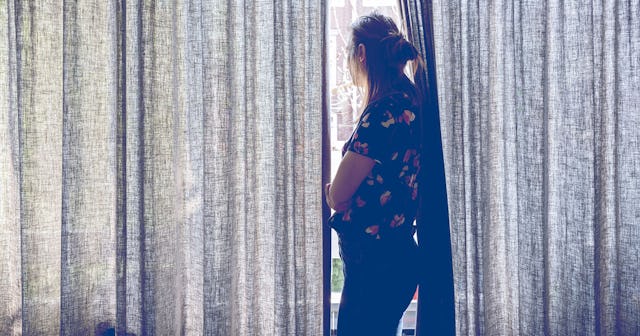We Need To Talk About The Fact That COVID-19 Is More Serious (And Deadly) In People With Intellectual Disabilities

In college, I worked in a residential group home for boys with intellectual disabilities and some with autism. Most of the time, it was a calm home environment where teenage boys lived, a safe place they called home as their own families visited now and again. We as the staff, their care coordinators, and house managers, doubled both as their caregivers and in some ways, their family members too.
I was a twenty-something living the stereotypical college student kind of life — hanging out with friends on Friday nights instead of studying all night, storing up my dirty clothes to wash when I went home, surviving on ramen noodles and potato chips. But I also took a special pride in my job, showing up for young men who had no real prospects aside from what we were providing for them as their staff: safety, stability, a social life, and medication management.
Today, as we look at what the pandemic is doing to people we love, family members and friends, how devastatingly painful it is for us all, we are forgetting about another population of people: those with intellectual disabilities and autism who often live in a residential and/or group home settings, like the young men I helped care for in college. It is this demographic of individuals, those with these particular disabilities, that we are not talking about during this pandemic. Let’s make room to talk about why they are dying at higher rates and how we can help decrease the number of reported deaths of this fragile population.
In a study that looked at group homes within New York and Pennsylvania, the findings were astonishing. Specifically, the rate of death among people with autism who contract COVID-19 die at higher rates than other populations according to a study conducted by NPR.
According to the study, in New York State (where I went to college and worked in the group home), people who contracted COVID-19 and had an intellectual disability died at a rate 2.5 times higher than others, and in Pennsylvania, the same demographic died at two times the rate as others who test positive.
Visoot Uthairam/Getty
So why are people ages 18-74 with autism and developmental disabilities dying at higher rates than Hispanic and African Americans? This particular demographic also often has underlying issues ranging from respiratory issues to diabetes to high blood pressure, conditions that make them susceptible to succumbing to the virus. Not only this, but they also tend to live in confined spaces, like group homes, where the virus can spread like wildfire, much like it spreads within nursing homes (remember Washington State?) In many cases, proper social distancing protocols are literally impossible to follow.
There’s also the continuing problem of inequalities in our healthcare system. A 2009 study by the American Academy of Developmental Medicine and Dentistry found that “limited educational opportunities are offered in schools of medicine and residency programs to prepare students for the care of individuals with disabilities. In most instances, no clinical experiences are provided.” That’s right — the majority of healthcare professionals in training are not even instructed in the differences they may face while caring for a patient with special needs.
As the parent of a teenager with autism who also has asthma, I worry about his health during the pandemic. Of course, as a teenager, he is also a bit defiant and often would rather not wear his mask or practice social distancing. I’ll save that debate for another article. But we need to start being more vocal about the health and mortality rate of those with intellectual disabilities and autism. Here in America, we tend to treat our elderly and those living with disabilities as “less than,” and we are not discussing their health during the pandemic as a priority.
We choose to approach their lives and livelihoods with an “out of sight, out of mind” mentality. This is unfair on so many levels. Their lives and their health are just as valuable as the able-bodied. If they are impacted by the virus and get sick, they will suffer and need ventilators just as any of us might. Like my own son’s life, their lives matter, and should not be overlooked or forgotten about because they are tucked away in residential communities.
As hospital beds continue to fill up across the United States and numbers continue to soar, especially in the South, we must keep in mind that people with intellectual disabilities have an additional challenge to face right now: society’s failure to recognize the value of their lives.
This article was originally published on